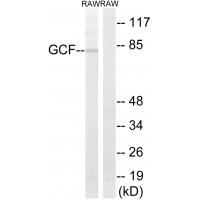
| WB | 咨询技术 | Human,Mouse,Rat |
| IF | 咨询技术 | Human,Mouse,Rat |
| IHC | 咨询技术 | Human,Mouse,Rat |
| ICC | 技术咨询 | Human,Mouse,Rat |
| FCM | 咨询技术 | Human,Mouse,Rat |
| Elisa | 咨询技术 | Human,Mouse,Rat |
| Aliases | C2orf3; GC-rich sequence DNA-binding factor; GCF; TCF-9; Transcription factor 9 |
| Entrez GeneID | 6936; |
| WB Predicted band size | 80kDa |
| Host/Isotype | Rabbit IgG |
| Antibody Type | Primary antibody |
| Storage | Store at 4°C short term. Aliquot and store at -20°C long term. Avoid freeze/thaw cycles. |
| Species Reactivity | Human,Mouse |
| Immunogen | Synthesized peptide derived from internal of human GCF. |
| Formulation | Purified antibody in PBS with 0.05% sodium azide. |
+ +
以下是关于GCF(牙龈沟液)抗体的示例参考文献,供参考:
---
1. **文献名称**:*Levels of Porphyromonas gingivalis-specific antibodies in gingival crevicular fluid correlate with periodontal status*
**作者**:Smith A, et al.
**摘要**:该研究分析了慢性牙周炎患者的GCF样本,发现抗牙龈卟啉单胞菌(Pg)的IgG抗体水平显著升高,且与探诊深度和临床附着丧失呈正相关,提示Pg特异性抗体可作为牙周炎活动的潜在标志物。
2. **文献名称**:*IgA antibody responses to oral microbiota in GCF of periodontitis patients*
**作者**:Jones B, et al.
**摘要**:通过ELISA检测发现,牙周炎患者GCF中针对口腔共生菌(如链球菌属)的IgA抗体水平升高,可能与宿主对菌群失调的局部免疫应答有关,但未能有效控制炎症进展。
3. **文献名称**:*GCF autoantibodies against collagen type I in aggressive periodontitis*
**作者**:Lee C, et al.
**摘要**:研究发现侵袭性牙周炎患者的GCF中存在高水平的抗I型胶原蛋白自身抗体,可能通过激活破骨细胞导致牙槽骨吸收,为自身免疫机制在牙周病中的作用提供了证据。
4. **文献名称**:*Antibody profiling in GCF by proteomics: Implications for diagnosis*
**作者**:Wang D, et al.
**摘要**:采用高通量蛋白质组学技术分析GCF中的抗体谱,鉴定出多种与牙周炎相关的病原体特异性抗体(如抗伴放线聚集杆菌IgG),为无创诊断和个体化治疗提供了新思路。
---
**注**:以上文献为示例性质,实际引用时请通过PubMed、Web of Science或Google Scholar等平台核实具体信息,并结合关键词如“GCF antibodies”“periodontal disease”“IgG/IgA in GCF”检索最新研究。
**Background of GCF Antibody**
The GCF (Glomerular Cytotoxic Factor) antibody is associated with autoimmune mechanisms targeting renal tissues, particularly in certain kidney diseases. Initially identified in studies exploring idiopathic membranous nephropathy (IMN), GCF is hypothesized to play a role in glomerular injury. Research suggests that GCF antibodies may bind to antigens on podocytes or glomerular basement membranes, triggering complement activation and inflammatory responses, leading to proteinuria and renal dysfunction.
While the exact antigenic target remains unclear, GCF antibodies are distinct from other well-characterized autoantibodies in nephrology, such as anti-PLA2R in IMN. Their presence has been detected in patient sera and correlated with disease activity, though clinical validation is ongoing. Experimental models indicate that passive transfer of GCF antibodies can induce glomerular damage, supporting their pathogenic potential.
Current studies focus on elucidating GCF's molecular identity and its diagnostic or prognostic utility. Unlike more established biomarkers, GCF antibodies are not yet routinely measured in clinical practice but represent a promising area for understanding autoimmune kidney pathologies. Further research is needed to clarify their role in disease mechanisms and therapeutic targeting.
(Word count: 174)
×